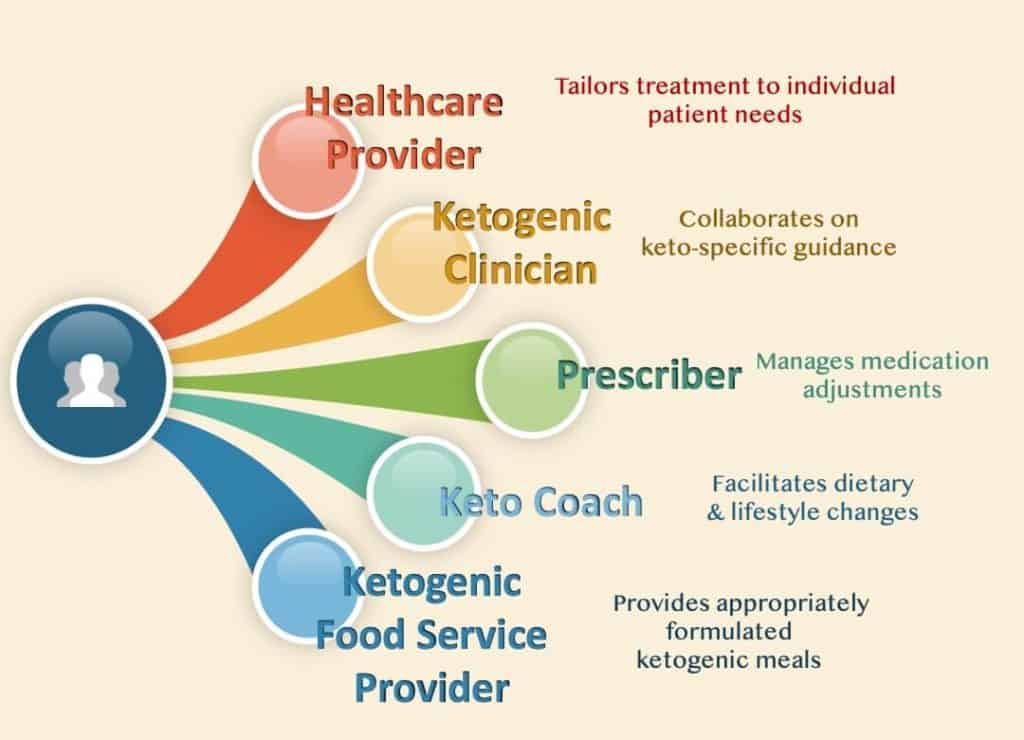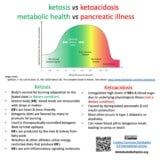How to build my ketogenic therapy treatment team

Building a team to treat any illness with medical ketogenic therapies is often a difficult, multi-step process. Ketogenic dietary intervention is in its early stages in healthcare. Yet research has demonstrated its potential effectiveness for many disorders. These range from epilepsy to polycystic ovarian syndrome, from diabetes to hypertension, from Alzheimer’s to schizophrenia. In fact, evidence shows over 40 conditions with a metabolic component respond positively to reduced-carbohydrate nutrition. Yet, many clinicians are unfamiliar with its multiple indications. They are also unsure of how to implement this therapy. This situation is slowly changing, but maybe not fast enough for you. Here is your guide to advocating for yourself in the meantime.
Keto for the treatment of illness vs. Instagram Keto
Using a medical ketogenic therapy for the treatment of health issues is a serious undertaking. It is very different from reducing carbohydrates to lose a few pounds. The pitfalls are many, and they can be dangerous. Enlisting the help of your keto-knowledgable health care team helps ensure success while minimizing the risks. And, your self advocacy and willingness may help educate your caregivers.
Pitfalls
Now to examine some potential pitfalls. Let’s say someone doing a medical ketogenic diet as treatment for brain disorder makes a mistake in the diet. Dangerous symptoms could result. For example, an epileptic person eats the wrong food and has a seizure. Pretty serious. Let’s say a person with schizophrenia makes a distary mistake and becomes suicidal. Another serious outcome. Dr. Chris Palmer, MD says it well when he warns us to, “Please proceed carefully with this prescription-strength intervention(1), for it has both potent potential benefits as well as dangers. It is just like any other potent medical intervention.” (2) With these cautions clear in your head we can proceed to building your team.
Building my own keto treatment team
The current reality of this cutting-edge therapy may be that a patient needs to build their own team. Patients will benefit by having both excellent medical care and careful ketogenic guidance. For example, an open-minded psychiatrist or endocrinologist could partner with a clinician experienced in medical ketogenic interventions.
Start with a competent healthcare provider interested in trying ketogenic-dietary therapy. You may need to persuade your provider to entertain this therapy. Our three metabolic health research portals can help you find articles relevant to your disorder to share with your clinician. These printable resources for sharing (Obesity, Type 2 Diabetes, NAFLD, Menopause, ASD/ADHD, CVD, Hypertension) might help as well.
Five roles on my keto treatment team

Some or all of these roles could be filled by the same person.
1. Competent, interested healthcare provider.
Perhaps your current clinician is interested in trying ketogenic dietary therapy? Across disciplines many professionals are frustrated with the high percentage of patients with chronic metabolic and mental illnesses who don’t get better with standard treatments.
A therapeutic ketogenic diet provides a well-researched, metabolic treatment alternative for many disorders. (2, 3) The opportunity to employ an effective metabolic therapy may interest your clinician. Most clinicians warn that if you are on any prescription medications then you need to understand that your medications are likely to change frequently, especially in the first 4 – 12 weeks of the diet. While not a contraindication, medications and potential side effects need to be managed carefully. Otherwise things can get dangerous quickly.
Consult and incorporate specialties into your team as needed. For example, endocrinology, cardiology, neurology, and psychiatry. If you have a mental health condition, then include a competent mental health professional, preferably a psychiatrist or psychiatric nurse practitioner. (4,5)
2. Ketogenic clinician
This role could be filled by a specialist physician, a primary-care doctor, a nurse practitioner, or a registered dietitian. This person would collaborate with your primary clinician to provide keto- specific guidance.
This approach also enables many keto-experienced clinicians to expand their reach. It enables them to collaborate with several keto-inexperienced providers simultaneously. This structure of one to many consultations can increase the number of keto-fluent practitioners by training providers in an apprentice-like way. That is they learn from the expert while they treat their own patients.
If you are using a medical ketogenic diet for a brain disorder such as epilepsy or a mental disorder such as schizophrenia, then a prominent psychiatrist recommends using a Therapeutic Ketogenic Dietitian (TKD). These Registered Dietitians are not only experienced in using the ketogenic therapy for epilepsy, but are also willing to work with your mental health treatment team.
You might find our following lists of ketogenic clinicians useful:
Keto doctors near me, 20+ directories.
Optional additions to your treatment team
3. A Prescriber
If you are on any prescription medications then your team must include a prescriber, an MD or APN, licensed in your state. (During the COVID crisis some states changed state specific licensing rules, which encouraged telemedicine.) Frequently this is either the healthcare provider or the ketogenic clinician described above. Your medications are likely to change frequently as you experience changes induced by the diet. Medications and potential side effects from them and the diet itself need to be managed carefully. Otherwise things have the potential to get dangerous quickly.
Luckily, there are now guidelines for deprescribing many medications typically related to type 2 diabetes. However, metabolic psychiatry is in a much earlier phase. Dr. Chris Palmer warns “Tapering people off psychiatric medications can be extraordinarily difficult and dangerous.” Clinical trials for patients with bipolar are currently underway that may help.
4. Keto Coach
Keto coaching is a type of health coaching. A keto coach can help you incorporate change into your lifestyle. The coach will be familiar with the time, effort, and social challenges involved in successfully using the ketogenic dietary approach. Research shows that coaching helps facilitate change by encouraging and reinforcing new behaviors. (6, 7, 8) At this time there is no universally recognized certification process for health coaches. As a result, coaches of varying expertise may offer this service. Your keto clinician may be able to provide you with a recommendation.
You may also engage other coaches such as a physical trainer, a yoga instructor. Try our list of Keto Coaches near me.
5. Ketogenic Food Service Provider.
While there may be many who want to perform this service for a fee, be warned that many are not prepared to offer a medical ketogenic diet. Food services are not licensed clinicians and are not likely to know the intricacies of dietary interventions. These services should be used with caution and in collaboration with your keto clinician.
In many cases families learn to prepare their own ketogenic meals.
Demand and supply of experienced clinicians
There is also clear demand for clinician-led caregiver-support groups and keto-friendly out-patient and in-patient services. While these services are not yet widely available, we are hopeful that they will be soon. In the meantime, online virtual clinics exist. Examples of these include Virta Health and The Fasting Method. Both of these services help people with diabetes and obesity.
You may need to pay for quality information
With the Internet, consumers have become accustomed to information being free. But in this case hiring professionals to guide you in this high-stakes endeavor makes sense. Although we have nothing to sell and can not see patients, we recommend collaboration with clinicians well-versed in this treatment. An expert clinician can tailor the medical ketogenic diet to your individual circumstances.
Bibliography curated by disease indication.
- A physician curated bibliography sorted by disease indication. Bibliography – Medical ketogenic diet for metabolic and mental health research. ( ~25 studies)
Useful tips when talking with your doctor about a keto lifestyle
- Metabolic Multiplier’s – Keto Doctors near me (and dietitians, nutritionists and coaches)
- Low Carb Cardiologist – How to talk to your doctor about the low-carbohydrate, high-fat and keto lifestyle
- Ken D Berry, MD: How to find a Low-Carb / Keto Doctor (MD Websites-2020)
Some of our other articles might also interest you
- Best resources for carb-reduction therapies
- Best keto resources for clinicians
- Clever Eats: Progressive Steps towards Metabolic Health
- Fact check – Americans Can’t Afford to Wait Any Longer. It’s Time to Overhaul the U.S. Dietary Guidelines
- Might the ketogenic diet help fight Alzheimer’s Disease?
- Relieving depression with the ketogenic diet?
Fact checked by Christie Barnett, APN and Captain Captain Mani Malagon.
Sources & Notes
- I first heard the term “prescription-strength Intervention” coined by Dr. Eric Westman, an early leader in the low-carbohydrate field. Dr. E. Westman & Dr. C. Palmer co-authored Doris’s chronic schizophrenia put into remission bringing hope to many
- See Dr. Chris Palmer’s summary The Ketogenic Diet May Help Stop Seizures: The ketogenic diet is the latest diet craze, but it turns out that it’s not new at all. It’s been around for almost 100 years, and can have profound effects on the brain.
- Several Zotero citation libraries may help. Metabolic Multiplier’s contains over 350 articles by diagnosis. The Keto Science Library contains over 7,000 citations.
- Psychiatrist, Dr. Chris Palmer’s presentation at Low Carb USA, January 2019
- Dr. Chris Palmer’s presentation at the Metabolic Health Summit, January, 2020
- Institute of Coaching. Coaching Outcomes Research – Health & Wellness. (Retrieved April 7, 2020). https://instituteofcoaching.org/resources/list?field_resource_topics_tid%5B%5D=4839 Curated research to understand how coaching can benefit health and wellness outcomes.
- “Coaching in Leadership and Healthcare 2019 Conference.” Offered by Institute of Coaching and McLean Hospital, a Harvard Medical School Affiliate. Christopher Palmer, MD was a course Director
- McMahon, Stephanie. (Retrieved April 7, 2020). “Health Coaching Research and News” Functional Medicine Health Coach. Provides a nice summary of several studies and articles regarding health and wellness coaching.











5 Responses
[…] Build my Keto Team […]
[…] Build my Keto Team […]
[…] Build my Keto Team […]
[…] How to build my ketogenic therapy treatment team […]
[…] Build my Keto Team […]